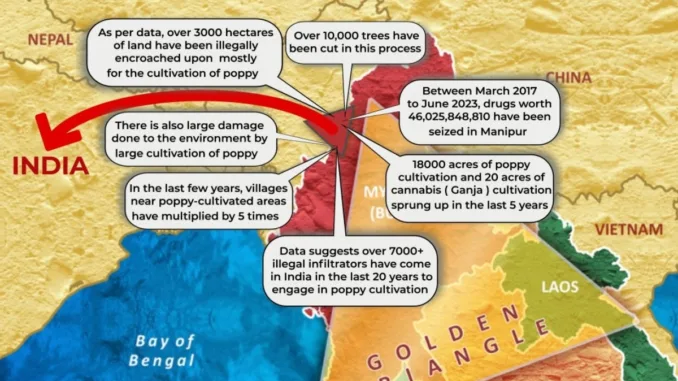
[ad_1]
The picturesque landscape of Manipur belies a simmering tension between different ethnic communities in the state. This ongoing clash between the Meiteis and Kukis, marked by violence, mistrust, and socio-political tensions, demands a nuanced understanding. Beneath the surface, a complex web of internecine conflict and a deadly trifecta of militancy, narcotics, and illegal infiltration paints a troubling picture that poses significant threats to India’s national security.
The historical underpinnings of engineered fractures between the Meiteis, Nagas, and Kukis could be traced to British colonial policies that sowed the seeds of division. Manipur’s annexation by the British in 1891 and the planting of the Kuki tribe deepened tensions, leading to territorial disputes and power struggles. At the heart of the conflict lies a struggle for land and natural resources, with the indigenous Meiteis and Nagas safeguarding their land and heritage, and Kukis asserting rights to the hill territories. The Nagas claim that the Kuki have no land in Manipur at all and the name of their community was first heard when the British “planted” them on the Naga hills between 1830 and 1840.
Hoineilhing Sitlhou, a teacher at Hyderabad University, is of the view that in Kuki traditions, the Village Chief is the proprietor of the land, and “the chiefdom is distributed to the villages for cultivation and for making homesteads.” While the concept of ancestral land, ownership, and inheritance did not exist in Kuki ethos, today Kukis own land in the Imphal Valley and parts of India.
The Indo-Myanmar border has emerged as a focal point of concern. Manipur and Mizoram have seen a massive influx of immigrants from Myanmar, particularly after military coups in 1962, 1988, and 2021. By June 2023, around 40,000 Myanmar nationals crossed into Mizoram. In Manipur, 2,187 illegal immigrants were identified within two days by a committee led by Tribal Affairs and Hill Development Minister Letpao Haokip. Illegal infiltration has raised alarms and created a feeling of insecurity.
The unchecked influx of undocumented immigrants poses a serious threat, potentially sparking power struggles between foreign anti-national groups and the indigenous populace. Infiltration of Myanmar Kuki-Chins has previously ignited the Naga vs. Kuki conflict (1992 – 1999), Kuki vs. Paite (1997–1998) in Manipur, and the Kuki vs. Karbi clash (2003 – 2004) in Assam.
Manipur’s 398-km-long porous border with Myanmar facilitates illicit activities, including movement of individuals, arms, and narco-terrorist. Kuki militants, especially the Zomi Revolutionary Army (ZRA), under a Suspension of Operations, SoO, with the Indian government, are deeply involved in this illicit trade. In fact, ZRA leader, Thanglian Pau, was an elected Member of the Parliament of Myanmar in 1990 and General Secretary of the Zomi National Congress, ZNC. He was expelled from ZNC for being an informant of the Burmese military. He now lives in Churachandpur, holds an Indian passport, and has changed his name to Thanglian Pau Guite. In Churachandpur, the ZRA functions as a parallel government, collecting taxes and ostensibly ‘protecting’ travelers from other armed groups.
The ZRA exploits extensive poppy plantations for funding, exacerbating violence and instability in Manipur. Seizures of narcotics, valued at INR 4602 crores in the international market from March 2017 to June 2023, underscore the severity of the issue. Investigations following opium seizure valued at 40 crores in Delhi on August 20, 2023, revealed an interstate drug cartel linked to Churachandpur, the Manipur-based suppliers procure the raw material from hilly areas around the international borders of Manipur and Myanmar. This nexus between militants and narcotics poses substantial threats to India’s national security and undermines socio-economic development.
Complicating matters is the influx of asylum-seekers fleeing Myanmar’s unrest. India’s non-signatory status to the UNHCR’s Refugee Convention 1951 leaves these vulnerable individuals susceptible to exploitation by militants. Compelled into poppy cultivation as a cheap labor force, they serve the dual role of providing a workforce for drug production and prolonging instability.
The opium poppy cultivation in Manipur serves as a major driver of the conflict, rather than solely an economic pursuit. A senior Indian government official, tasked with combating drug trafficking in the Northeast, affirmed the Zomi Revolutionary Army’s active involvement in opium cultivation. This nexus between the Kuki militants and narcotics poses another formidable challenge. During a massive drive to combat poppy farming in March 2023, ADGP Clay Khongsai cautioned that the opium trade bolsters their financial resources, enabling subversive activities and perpetuating the cycle of violence.
As poppy cultivation expands, environmental degradation increases. Ram Wangkheirakpam, an environmental activist, warns, “Large-scale Poppy plantation is a major threat to soils, waters, forests, wetlands, and rivers that make up our ecosystems and biodiverse nature. Adding to this is the unfolding effects of climate change. We must immediately act to reclaim and rehabilitate these deforested lands so as to ensure that its associated violence is curtailed as well as give back life to these forests,” underscoring the gravity of the situation.
Out of 15,497 acres of poppy cultivation, 13,122 were in Kuki-Chin areas as per the Narcotics and Affairs of Border (NAB). In 2010, Sarangthem and Dr. Kumar reported that natural forests covered 1.68 million hectares, accounting for 77% of Manipur’s land area. By 2021, the state lost 46.3 thousand hectares of vital primary forest, with Churachandpur bearing the greatest impact at 64.4 thousand hectares. This points to a gradual expansion of the Golden Triangle in ZRA-dominated Myanmar-Manipur border, which is emerging as an opium cultivation hill that makes the drug trade easier.
The primary cause of the Meitei-Kuki conflict and the Kuki’s demand for a Separate Administration is projected as a reaction against the Manipur High Court verdict (W.P. No. 229 of 2023, dated April 19, 2023) on the Meiteis’ demand for Scheduled Tribe status, identity politics, and contestation over land and resources. However, a comprehensive understanding requires factoring in infiltration, narcotics proliferation, and militant influence. This complex interplay threatens India’s national security, making it imperative to address the root causes of violence in Manipur.
Addressing this complex issue demands a holistic approach encompassing socio-political dialogue, immediate NRC implementation, and stringent law enforcement. Stability in Manipur hinges on collaborative partnerships between the state, central authorities and local communities.
The article is contributed by Dr. Billie T. Guarino & Dr. Rajshree Keisham
Dr. Billie Thoidingjam Guarino, a Saint Anselm College professor and 2022 COARC-INYA Scholar’s Fellow, has 15 years of experience, including teaching at JMI, the University of Delhi, and roles with UNFPA Myanmar and SIAS (ICOE, Yangon). Her research covers resistance movements in India and Myanmar, #MeToo in South Asia, insurgency, gendered violence, and social movements in northeastern India, as well as inclusive pedagogy, minority literature, feminist security studies, migration, and conflicts in South & Southeast Asia.
Dr. Rajshree Keisham, a Ph.D. in Sociology specializing in Gender Studies and Socio Anthropology. She focuses on social issues, particularly gender dynamics and cultural anthropology. As a former UNESCO researcher, she’s illuminated challenges faced by children across cultures, informing policy recommendations. She’s a fervent advocate for social justice and empowering marginalized communities, inspiring positive social change.


